UK. The Airport Operators Association (AOA) and the UK Travel Retail Forum (UKTRF) today launched a voluntary Code of Practice (CoP) that most airport retailers in the UK have agreed to implement. The aim is to ensure greater transparency in how customers benefit from VAT relief.
The move was prompted by last year’s media attacks on airport retail pricing in the UK, which in turn led to the then Chancellor George Osborne announcing an investigation into airport VAT-free shopping in December. [See below for full background]
The UKTRF and AOA said that the industry-wide set of guidelines should “give clarity” to customers by requiring airport retailers to:
*Provide a clear explanation (in-store and/or online) to all customers about how the VAT benefit is used and about when and why customers are required to present boarding passes;
*Report to the UKTRF on how they implement the Code.
Signatories agree that the benefits generated by airport retailers’ VAT relief concessions are directly reflected in lower prices for passengers.

The initiative is endorsed by UK airports, which will facilitate customer enquiries about the Code.
AOA Chief Executive Darren Caplan said: “AOA member airports are determined to ensure that passengers have an excellent experience from the moment they arrive at the airport to the moment they leave. We have worked closely with airport partners and retailers to improve information and transparency about how the retailers apply the VAT relief concession, ensuring travellers can continue to shop at UK airports confident in the knowledge that they are getting a great deal.”
UKTRF Chair Sarah Branquinho said: “Our members have an exemplary record of compliance with HM Revenue & Customs laws, Advertising Standards Authority guidelines and Trading Standards Authority consumer legislation, but the Code of Practice will go one step further in ensuring transparency and consumer trust. This new measure will help ensure that customers know that the savings resulting from the VAT relief concession are passed on to them.”
Retailers at all major UK airports, representing from 75% to 100% of all sales at those airports, have signed the Code of Practice, said UKTRF. They include big duty free retailers such as World Duty Free and Lagardère Travel Retail, plus WHSmith, Dixons Travel and Boots, which were the subject of much criticism about their pricing last year (full list below).
In a media briefing last night, Branquinho noted: “This all began last summer when we had a lot of media interest in the airports, questioning whether passengers were getting value from airport shopping. We looked closely at this and it became clear that the issue was mainly one of transparency and whether passengers were benefiting from specific pricing.
“While this was happening the Chancellor also announced a review of airport shopping, and made a number of assertions about retailers not giving back money to customers. So we set out to address that point. We spoke to HMRC, to the Department of Innovation & Skills and the Department of Transport. We discussed the system with them and everyone agreed it could be made clearer for customers. So that prompted the idea of a Code of Practice.
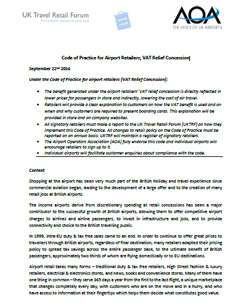
“It’s very simple. Retailers are asked to sign up to it and adhere to it. They are then each responsible for their own interpretation and implementation of it.”
Individual retailers are expected to promote their price transparency through signage in the stores and on their websites in the months ahead, though there is no shared campaign across the UK airports.
Branquinho said: “Each retailer has come up with their own version of the signage. It is a matter for each how they communicate it in-store, or whether they use their websites. It’s not the UKTRF’s role to prescribe how it’d done. The Code of Practice sets a bottom line and retailers follow this.”
Asked by The Moodie Davitt Report whether a uniform message would be more coherent and easier for travellers to understand, Branquinho said: “It’s not that simple. Some retailers give back the concession benefits in full back to non-EU travellers on production of boarding passes. Others offer a shared benefit spread across all customers, and some are not part of the scheme and just charge high street prices (see below for the airport retailer categories and how VAT is returned to the customer).
John Hume of industry lobbyist Hume Brophy, which is working on the campaign with UKTRF, said: “There are different operating models but one central theme: that retailers will provide a clear message on how the VAT benefit is used. There are also the issues of when a boarding pass must be presented, for example in the case of a duty or tax free sale. These are important things to customers but can differ retailer by retailer.”
Compliance levels
The UKTRF plans to monitor compliance levels with the Code of Practice in coming months.
Branquinho said: “We will meet HMRC later this year to see if there have been any complaints. In the meantime UKTRF will list what each retailer is doing. We’ll review this with HMRC.”
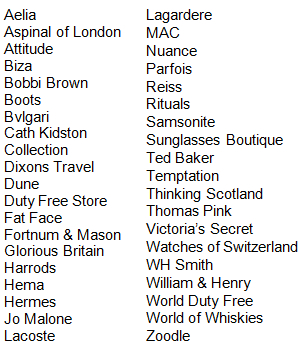
She added: “Airports have also been very active in encouraging retailers to sign up to the Code. They are committed to taking customer inquiries about the Code and that will also help them monitor customer concerns. We’ll centralise that information so we have a view across all of the airports.”
The UKTRF said that to date, no company had refused to take part.
“In some cases it just takes time,” said Branquinho. “The big players have signed up, including all of the airport specialists. It may be more difficult for some smaller high street chains who have tiny airport operations to get this in front of their legal teams but it’s not a concern at this point.”
Hume added: “At some airports 100% of the retailers have signed up, at others it’s the majority. We are talking to more of them. Boots only signed up on Wednesday this week, for example. At others they have legal or compliance people looking at it but so far none have refused.”
Asked by The Moodie Davitt Report about the perception of value among UK consumers, Branquinho said: “We surveyed stores at the UK airports and found that hardly any failed to give some special price airside [compared to the High Street -Ed], so there is value.
“But the message needs to be clear and this is why we need the transparency associated with the Code. If we have that I’m sure most retailers will have an explanation in their store of how they compare to High Street prices.
“The media reports bring into sharp relief why this is needed. The value is there and the savings are there, but the hype suggests otherwise. This is really a ‘belts and braces’ attempt to focus everybody on making the business more transparent. And that means having messages at the till point as well as on individual shelves and labelling.
Government concerns
Branquinho and Hume said that the government had welcomed the Code of Practice as a response to its concerns over airport pricing.
“The Conservative government has traditionally focused on how industries can find solutions themselves rather than adding more regulation. They have favoured this approach so we deliver results rather than needing more red tape.”
Hume added: “We don’t see an appetite to change the rules governing duty and tax free today. The government sees this Code as a pragmatic solution. For them it as an issue of transparency, not one that needs more regulation. Their response was enthusiastic. We hope that will be reflected in future policy towards duty and tax free.”
Asked whether the Code could be helpful in improving consumer perceptions of airport retail in advance of ‘Brexit’ – and potentially help lay the groundwork for a reintroduction of intra-EU duty free, Branquinho said: “We are all wondering what will happen and that remains to be seen. This plays a part in reinforcing the value message.”
Airport retailer categories: how VAT benefit is returned to the customer
Non-participants
These retailers do not operate the VAT relief concession and charge customers VAT in the same way as any other store in the UK. These retailers will not ask for boarding cards.
Direct benefit
These retailers sell at a VAT inclusive and a VAT exclusive price for customers who are travelling inside and outside the EU respectively. Hence the price paid by someone travelling outside the EU will be reduced by the VAT that would otherwise be charged. Only customers showing a boarding card for a non-EU destination will be entitled to the lower price and hence benefit from the relief.
Shared benefit
These retailers will have a single price for EU and non-EU travellers (with the exception of some liquor & tobacco items) and will recycle the VAT benefit into lower prices for all customers, which may require customers to show their boarding passes to identify qualifying sales. Retailers should make it clear to passengers whether this is an HMRC requirement (as part of an official agreement) or their own operating requirement. In all cases, the retailer will have signage in-store and on their website showing how the VAT benefit is being reflected in prices.
BACKGROUND: MOODIE ANALYSIS ON THE PRICING FURORE (FROM AUGUST 2015)
Q: What is a UK airport retailer’s legal obligation in relation to VAT?
A: Airport retailers must pass on to the Government the 20% VAT they receive on every item bought in store by intra-European Union travellers. If that traveller is leaving the European Union, however, they do not have to.
Q: Then in non-EU travellers’ cases what happens to the 20% VAT saving?
A: In almost all cases, UK airport retailers pass on the saving to the consumer.
Q: “˜Almost all’ – who are the exceptions?
A: Boots, WHSmith and Dixons Travel – the companies at the heart of the current media storm – do not. At Heathrow Airport, luxury goods brands Hermès, Louis Vuitton and Rolex are also only offering the saving to non-EU passengers.
Q: Sounds unfair. How do these retailers justify not passing on the saving they are making?
A: Each of them benchmarks their pricing against the High Street – and in Dixon Travel’s case against competitive online rivals. It guarantees in fact that its airport prices are less than the web prices of Amazon, John Lewis and Argos – and offers to pay double the difference if a shopper finds an item cheaper on those sites. Dixons said it is reviewing its policy and will from now make it clear to customers that the offering of a boarding card is not mandatory.
Boots is also reviewing its policy. It claims to offer all its customers (High Street or airport) “the same great value” and therefore currently has a single pricing structure, including the same promotions and rewards. It’s worth mentioning too that VAT rates vary significantly on items Boots sells from a zero rating to full UK VAT.
WHSmith said: “Any relief obtained is reflected in our single price and extensive promotional offers provided to all of our customers.”
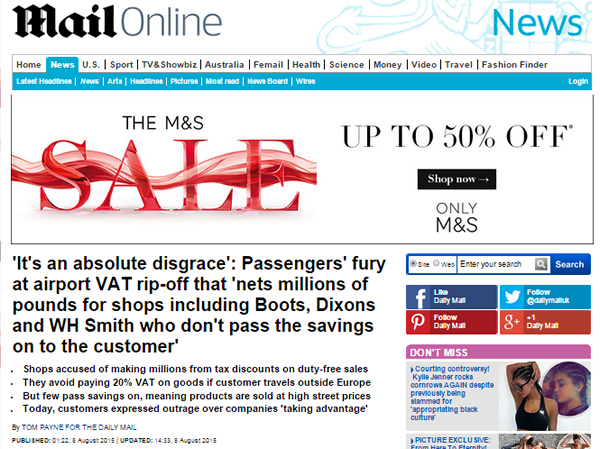
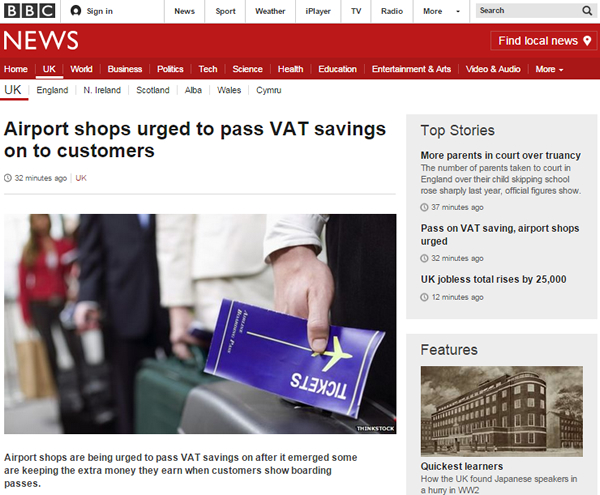
Q: That’s not an entirely convincing defence. Any mitigating factors?
A: Dixons Travel offers a very good price guarantee. And again it’s important to note that a large proportion of sales in WHSmith and Boots actually come from goods that are exempt from VAT – for example, books, magazines, newspapers, certain sandwiches, biscuits, pharmacy /healthcare products etc.
Q: Is it a legal requirement for stores to demand boarding cards at the point of sale?
A: It depends on the store involved. In a UK “˜duty free’ store (see below for definition), it certainly is. Categorically. There have been instances in the past few days of physical abuse of World Duty Free staff by consumers who have been asked for their boarding cards. The staff were, in fact, legitimately applying the law.
Q: So what’s the difference between a duty free retailer – such as World Duty Free – and, say, Boots or WHSmith?
A: Different rules apply. HMRC specifically requires duty free retailers to check customers’ boarding passes. Passengers must show their boarding passes when buying all products from a duty free retailer.
Q: All products? Not just alcohol and tobacco?
A: All products. HMRC confirmed the fact to us last week, saying: “Sales in duty free shops are tightly controlled as they can hold goods where the duty or VAT has been suspended. To ensure sufficient controls are in place, HMRC require duty free outlets to provide evidence of destination for all goods sold.”
To be clear, any “˜duty free retailer’ such as World Duty Free, The Nuance Group and Aelia operating at any UK airport MUST ask for passengers’ boarding cards at the point of sale.
Q: But a lot of the newspaper articles refer to “˜duty free rip-off’ etc. So not all airport shops are “˜duty free’ then?
A: Absolutely not. Duty free is an item sold free of excise duty, customs duty and VAT, such as whisky, vodka and cigarettes. By the way, since 1999 UK airport retailers can only sell duty free goods to passengers headed outside the EU.
“˜Tax Free’ refers to items sold prior to the addition of VAT (Value Added Tax). As mentioned, if the passenger is flying outside the EU no tax is applicable to HM Revenue & Customs (HMRC). If the passenger is flying within the UK or EU the VAT will be accounted to HMRC by the retailer. Because the VAT is fully accounted for, there are no limits to the amount that can be purchased (for personal use) by those passengers flying within the UK or EU.
Typical categories which are sold at tax free prices include: fashion and footwear, fragrance, skincare, cosmetics, sunglasses, watches, jewellery and handbags.
Such retailers bring all their products into their shops “˜duty and tax suspended’, i.e. out of bond. The tax is then accounted for to the HMRC through the reading of the boarding cards. Unlike, say, WHSmith, which is bringing its goods into the airport on a duty/tax paid basis and using the boarding cards to claim back the VAT on non-EU passengers’ purchases.
Q: But not passing it on to the customer?
A: Correct. And there lies the heart of the current furore.
Q: Is World Duty Free passing the saving on?
A: Yes.
Q: So World Duty Free – or for that matter any other UK airport duty free retailer – has done nothing wrong? Either in not passing on the tax and duty saving, or in asking for boarding passes?
A: Correct.
Q: What happens when World Duty Free sells, say a bottle of Scotch or perfume to an EU-bound passenger?
A: World Duty Free benchmarks its prices against the UK High Street. For EU passengers, products are discounted by at least the equivalent of VAT (this is funded by World Duty Free) and any applicable VAT on the purchase is still accounted for to HMRC.
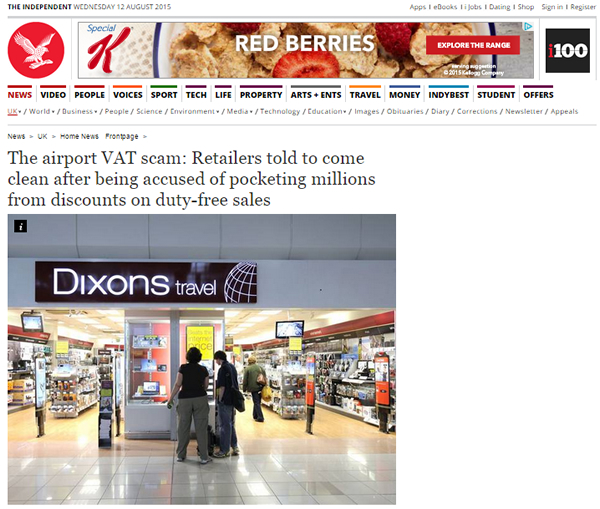
Q: Sounds complex.
A: Not really. For non-EU passengers, it’s simple – no excise duty, customs duty or VAT is paid by the shopper. In UK airports almost all dutiable goods are sold at the same price wherever the traveller is headed – EU or non-EU. In the former case, World Duty Free for example, would simply absorb the VAT.
Q: Ok let’s go back to the demand for boarding cards. You’ve answered the duty free retailing question – what about other non-duty free airport stores?
A: That answer’s complex, sorry. If the retailer is passing on the VAT saving to the intra-EU passenger, yes they are perfectly within their rights to ask for boarding cards. In order to pay the correct VAT in their tax return to HMRC they must be able to demonstrate the correct amount of VAT due – by showing who is going to the EU and who is going outside the EU.The only way they can do that is through the boarding card. So while no law specifically states that a passenger must show his or her boarding card, if every passenger were to refuse an airport retailer could not provide an accurate tax return to HMRC.
It’s simple really. Retailers must be able to prove that a sale is non-EU (to HMRC). If they can’t prove it, they would theoretically have to charge the EU passenger the High Street price.
Q: What’s the tax-free/VAT-free saving by the way? 20% as reported in the newspapers?
A: No. The VAT rate of 20% is added to the base price (so if the base price is, say, £20, £4 VAT is added), thus making VAT 16.66% of the final price, not 20% as indicated in all the newspaper reports.
Q: So, to repeat, this furore relates to three main retailers – Boots, Dixons Travel and WHSmith?
A: Mainly, yes. Plus the luxury retailers I mentioned at Heathrow.
Q: So what happens with, say, a High Street favourite such as Harrods, at, say, Heathrow or Gatwick Airport?
A: With the vast majority of retailers (and certainly Harrods), the passenger gets charged the High Street price minus the VAT discount, wherever they are headed, EU or non-EU.VAT is actually paid by those retailers on all the purchases that are made by travellers headed for EU destinations. However it’s not charged on to the passenger, it’s funded by the retailer as a discount instead. If the passenger is headed for a non-EU destination, they don’t pay VAT on it and neither does the retailer.
Q: So let’s be clear – with the majority of retailers, wherever you are travelling, you get the VAT discount?
A: Correct. They’re all offering the VAT saving, even though (like WHSmith, Boots and Dixons) they don’t technically have to.
Q: So could you argue that most airport retailers are actually offering airport shoppers a bonus that they don’t have to?
A: You could – it depends on how you spin the story.
Q: So is airport retailing a “˜rip-off’ or not?
A: It’s generally fair value and in the majority of cases (particularly if you’re travelling intra-EU) actually good value. But like all things in life it’s complex and often a matter of perception. The state of High Street and internet discounting means that you’ll always be able to find some products cheaper outside duty free or tax free. That doesn’t necessarily make airport shopping a “˜rip-off’.In today’s retail market, any retailer simply has to be competitive. Being in a so-called “˜captive market’ such as an airport is no protection. Consumers vote with their feet – and their wallets.Yes airport retailers have significant cost burdens compared with their High Street equivalents – long opening hours, high operating costs and so on – but that doesn’t tend to wash with the consumer and certainly not with the press. Each and every airport retailer must be mindful of the value they offer and this furore is a welcome reminder of that. It will be interesting to see how Boots, Dixons Travel and WHSmith structure their policies in the future.
Q: Rights or wrongs aside, it still seems like a public relations disaster for the airports and retailers concerned?
A: Well it isn’t good. But the reality, as you can see, is rather more complex. That complexity needs to be understood before becoming over-excited about terms such as “˜rip-off’. It’s pretty important to know what terms such as “˜duty free’ and “˜tax free’ actually mean, for example and some national newspapers don’t know the difference.












